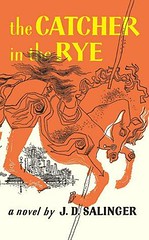 The Catcher in the Rye
The Catcher in the RyeJ.D. Salinger
Holden Caulfield kills me. He really does. He's a goddamn mess, that's what he is. I hate him. You know what really annoys me? When you read a book as a kid and then read it again a hundred years later and the crumby thing holds up.
I read The Catcher in the Rye as a teenager in the early 1960s. I never bothered to check the publication date; for 50 years I believed it came out just about the time I first read it. I was wrong: Salinger wrote it just after WWII; it was published in 1951. It had been an instant best-seller and was already an established classic by the time my rebellious schoolmates and I read it.
My primary reason for re-reading Catcher in the Rye was to learn why it's such a controversial book, why it so infuriates the book-banning crowd. I didn't expect to enjoy the experience: I assumed I'd outgrown the book in the same way I outgrew Kerouac's On the Road, which I thought life-changing as a 14-year-old but squirm-inducingly embarrassing as a senior citizen.
As it turned out, I loved reading Catcher again. Though I no longer share Holden Caulfield's teenaged angst and alienation, I still feel for him. He doesn't come across as some historical artifact, but as a flesh and blood kid, vivid and fresh, totally believable. Which, I guess, validates what I earlier said about assuming the book had just come out in the early 1960s when I initially read it. Even though Holden's story takes place in the 1940s, a reader in the 1960s could be convinced Holden was a contemporary, and even today, in 2013, Holden feels part of the here and now.
I remember being struck by Holden's swearing when I read the book as a kid. My classmates and I used the same language (and worse), but seeing it in print was shocking ... and liberating. Curiously, I remembered Holden saying "fuck" on almost every page, but that turned out to be another false memory. He doesn't use the word until the very end, and then only to deplore the fact that some unknown vandal has carved "fuck you" into the wall of a stairwell at his little sister's school. What Holden does say, and say often, is "goddamn," "bastard," "bitch," and "hell." That's mild language by today's standards, but it doesn't date the novel ... you feel like you're listening to a troubled but essentially polite and well-bred young man, someone who'd open up in a private conversation with a friend but never cuss in front of strangers. The language doesn't come across as quaint or outdated, and that's another reason the novel holds up.
As with the swearing, I remembered Holden talking about sex more than he actually does. He thinks about girls all the time but he's a virgin, and the one opportunity he has to get it on with a room-service prostitute, he's too shy to do anything and pays her to put her clothes back on and leave. He worries that the girls he knows will succumb to his older, more experienced, classmates' advances. He's aware of the existence of homosexuals and disdains them. That's as explicit as Holden ever gets about sex; what little he does say about the subject is abstract and non-pornographic.
So why does Catcher in the Rye push so many blue-nose buttons? It's hard to believe, but as recently as 2005 Catcher could still make the American Library Association's top ten list of challenged and banned books. When parents demand school administrators pull the book from library shelves and English class reading lists today, they cite Holden's language and vague talk about sex. They also cite his smoking and drinking, his lack of religious faith, his poor study habits, his overall negativity. They don't think he's a good model for their kids. I suspect that somewhere in there is some rural resentment of snobby upper-class New York City folks. That pretty much sums it up: they don't like Holden Caulfield and therefore they don't want anyone reading what he has to say. Maybe they're afraid their kids will feel as validated and liberated as I did when I met Holden in 1962.
You know what, though? Even though it's one of the most challenged, banned, and censored books ever taught in American high schools, it's also a best-seller and one of the most-taught books in American high schools, a beloved book to millions, a classic.
Holden Caulfield's still out there somewhere. I hope he didn't grow up to be just another goddamn phony. That would kill me, it really would.











1 comment:
Maybe later Young Adult books spoiled me, but I found Catcher in the Rye rather boring and not worth banning. Holden Caulfield is depressed, and he has a right to be with a dead younger brother. His form of depression is to wander around New York and find a proper home, while realizing that the world is a place full of phonies. I kinda prefer Robert Cormier's or Suzanne Collins's approach, with action-based drama to balance the angst. What am I missing here?
Post a Comment